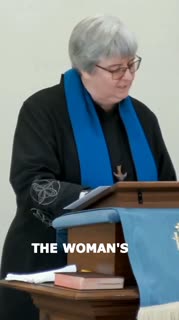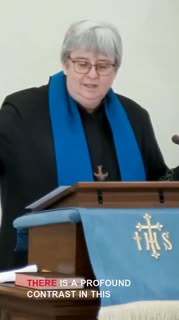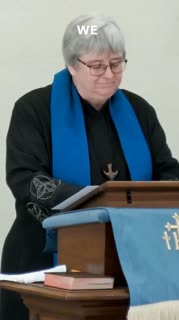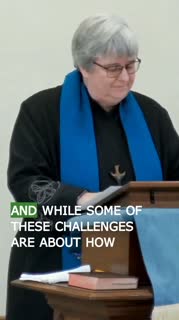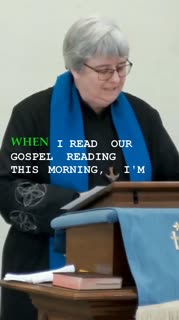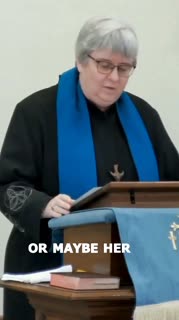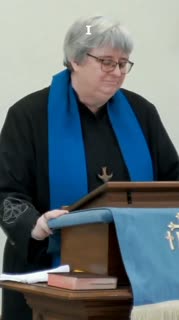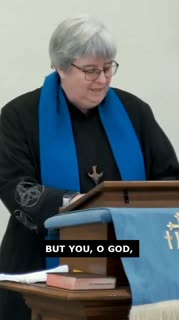True Generosity: The Power of Humble Giving
Devotional
Sermon Summary
Bible Study Guide
Sermon Clips
The woman's simple gift was offered with love and it was received with great mercy from her loving neighbors. And given its true worth during the Harambee. It was never really about the eggs, it was about giving, receiving, about mercy and love, about grace and offering what you can to your friends and strangers, and trusting that your community will support you when you give to others. [05:06] (29 seconds)
There is a profound contrast in this short reading, given between the widow and the scribes. The temple leaders, whom Jesus points out, love to walk around in long robes, demand attention, attend fancy banquets, and, in his words, devour widows' houses. This is part of a much larger critique that Jesus levels at the temple and its practices. [08:00] (31 seconds)
We so often think about stewardship in very individual terms. What am I going to give to the church this coming year? How am I going to use my precious time? How will I manage my resources? And those are important questions. What will I choose to use for myself and my family, and what will I give away? [09:44] (20 seconds)
I have to be honest, this gospel lesson exposing religious leaders makes me squirm, as I suspect that I'm probably not the only one, probably closer to the scribes than the widow in this story. We live in a nation with one of the highest per capita wealth in the world, and yet one of six of our children struggle with hunger sometime during the year. [10:34]
And while some of these challenges are about how to help individuals, it seems to me that some of the issues are also looking at how our systems are working. As we look at the issues of homelessness in this state, we know that one of the huge issues is our shortage of housing right now. [12:51] (23 seconds)
When I read our gospel reading this morning, I'm aware that it is a kind of critique of all of us who are part of these systems. Scholars debate whether our gospel is a lament against religious leaders who are allowing, maybe even causing, that poverty, or whether it is praise for the widow who gives her last two coins. [14:58] (24 seconds)
Or maybe her giving was born out of her relationship with God. She gave all that she had, and she's lifted up by many as giving in a way that would reflect Christ's giving for us. All in. Holding nothing back. The widow whom Jesus noticed is not just an object for charity. She's not just a burden on society. [15:57] (28 seconds)
And although she is struggling with poverty in harsh ways, we can see that she gave from her abundance. An abundance of generosity. An abundance of hospitality. An abundance of courage. Of community. And of faith. She reminds me of something that was said by theologian Juergen Moltmann, who wrote, The opposite of poverty is not wealth. [16:33]
I wonder if we could look around and see and notice the gifts of those who are on the very edges of our community. Even those who are struggling. Even those who are with us at work today. Even those facing injustice, if we, at the same time as we have compassion for them, can also value them and lift them up as God's children with much to offer us, with much to teach us. [17:20] (30 seconds)
But you, O God, feel no shame, fear no harm, as you walk among the poorest and the weakest, feeling completely at home. Thank you. Thank you. Thank you. Thank you. The voice of your love that keeps singing of the power in weakness, the wealth in simplicity, and the freedom and safety that is found in walking your humble and serving way. Amen. [18:19] (29 seconds)
Ask a question about this sermon
There is a profound contrast in this short reading, given between the widow and the scribes. The temple leaders, whom Jesus points out, love to walk around in long robes, demand attention, attend fancy banquets, and, in his words, devour widows' houses. This is part of a much larger critique that Jesus levels at the temple and its practices. [08:00] (31 seconds)
We so often think about stewardship in very individual terms. What am I going to give to the church this coming year? How am I going to use my precious time? How will I manage my resources? And those are important questions. What will I choose to use for myself and my family, and what will I give away? [09:44] (20 seconds)
I have to be honest, this gospel lesson exposing religious leaders makes me squirm, as I suspect that I'm probably not the only one, probably closer to the scribes than the widow in this story. We live in a nation with one of the highest per capita wealth in the world, and yet one of six of our children struggle with hunger sometime during the year. [10:34]
And while some of these challenges are about how to help individuals, it seems to me that some of the issues are also looking at how our systems are working. As we look at the issues of homelessness in this state, we know that one of the huge issues is our shortage of housing right now. [12:51] (23 seconds)
When I read our gospel reading this morning, I'm aware that it is a kind of critique of all of us who are part of these systems. Scholars debate whether our gospel is a lament against religious leaders who are allowing, maybe even causing, that poverty, or whether it is praise for the widow who gives her last two coins. [14:58] (24 seconds)
Or maybe her giving was born out of her relationship with God. She gave all that she had, and she's lifted up by many as giving in a way that would reflect Christ's giving for us. All in. Holding nothing back. The widow whom Jesus noticed is not just an object for charity. She's not just a burden on society. [15:57] (28 seconds)
And although she is struggling with poverty in harsh ways, we can see that she gave from her abundance. An abundance of generosity. An abundance of hospitality. An abundance of courage. Of community. And of faith. She reminds me of something that was said by theologian Juergen Moltmann, who wrote, The opposite of poverty is not wealth. [16:33]
I wonder if we could look around and see and notice the gifts of those who are on the very edges of our community. Even those who are struggling. Even those who are with us at work today. Even those facing injustice, if we, at the same time as we have compassion for them, can also value them and lift them up as God's children with much to offer us, with much to teach us. [17:20] (30 seconds)
But you, O God, feel no shame, fear no harm, as you walk among the poorest and the weakest, feeling completely at home. Thank you. Thank you. Thank you. Thank you. The voice of your love that keeps singing of the power in weakness, the wealth in simplicity, and the freedom and safety that is found in walking your humble and serving way. Amen. [18:19] (29 seconds)
